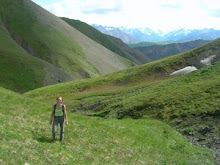Part of my recent spurt of getting-back-to-my-roots activities has included attending concerts instead of just playing them. This means that in the past few months I've been to a contemporary duo concert (a cello-violin duo that I know and play with here collaborating with a soprano-string bass duo from Ann Arbor) and my very first Civic concert as an observer, which is not a great showing but a lot better than much of the previous few years. And tonight I had a whole new experience: a baroque concert!
My friend Anna plays baroque cello with a group of early music enthusiasts that goes by the name of Baroque Band. She's been trying to get me to go to a show for about a year now, but I've always been too busy or lazy or poor to go. But I finally made it tonight, and it was such an experience! It was an all-Vivaldi concert, two concertos (sans soloists as we would think of it) plus the Four Seasons, known to many from various commercials, weddings, cheesy classical music clips for the general public, etc. But truly, this was the Four Seasons as I've never heard it before, and I loved it. The soloist, Monica Huggett, was positively amazing. I've heard these pieces a million times (or at least parts of them half a million times) but she made them her own. I don't know how well I can explain this, but here is my best shot: Many times, when you hear this music (or this kind of music), it's performed on modern instruments-- which are different in crucial ways, both in sound and playing technique-- and in a very straightforward way. Tonight's concert was on baroque instruments, and more importantly, took some incredible liberties with the tempo, tone, and even with notes. She slowed down, stopped, took huge amounts of time or none at all between thoughts, made noises that weren't remotely violin-like, gestured wildly while playing, and basically did things that I would never have the chutzpah to do myself while still maintaining the integrity of the music. It was so much more interesting! And I finally got a real sense of the seasons themselves. In Spring, she sounded like a bird, and it was gorgeous. Summer was intense, like going crazy from the heat. Winter was full-on scary for a while. The entire group started out playing ponticello (playing right next to the bridge, the piece of wood that holds the strings up), which makes this whistling, screeching, nearly toneless glassy noise. It gave me the shivers. (And actually this, among other aspects of the performance, reminded me greatly of contemporary music. It's a fine line. Historical connection suddenly became clearer.)
I talked to Anna after the concert, and I told her how amazing I thought it was. She told me that frequently people seem to think she's "going soft" when she tells them about how much she loves baroque playing. We as classical musicians tend to conceptualize baroque music as boring, staid, too full of rules and with not enough flash and glitter to hold our attention. But really, even though there are rules, there's this freedom that is maybe only possible within that kind of framework. And isn't that like so many other things? I'd like to live my life like a baroque violin concerto: I want to have my guidelines but still be able to dance inside of them.
Subscribe to:
Post Comments (Atom)







1 comment:
I am musically unsophisticated, but the metaphors you drew from listening to this concert are beautiful. I really believe that unlimited freedom can be totally and completely overwhelming; structure can set us free. The really interesting question is who or what limits our freedoms; I'd like that decision not to lie with institutions but rather with individuals or maybe, MAYBE, with small groups.
There's also something to be said for a temporal component to structure. For example, as much as I love weekends, I also like the structure of the work week. It makes the freedom and fun of the weekend that much sweeter to me.
Speaking of restraint, I'm looking forward to our Nicholas Food cooking party! Mmm--bring on the vegetables!
Post a Comment